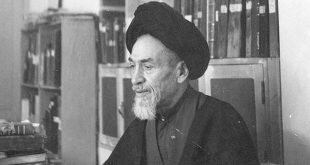
Shaykh Khaansari was born in Bid Aabaad, Isfahan, in 1917. His father was an eminent scholar in Isfahan.His Education and Emigration to Najaf
Khaansari began his preliminary studies in Isfahan until the age of eighteen, when he migrated to Najaf. In Najaf, he attended the lectures of Ayatollah Sayyid Abul Qaasim Al-Khou’i, Ayatollah Mirza Muhammad Baqir Zanjaani, and the late Shaykh Sadraa Al-Baadkoube’i. He also attended the lectures of Ayatollah Al-`Uzma Shaykh Muhammad Husayn Gharawi Isfahani, and the late Sayyid Abul Hasan Isfahani. After the demise of Ayatollah Shaykh Gharawi Isfahani, Khaansari began attending the lectures of Ayatollah Shaykh Muhammad Ali Kaazimayni, Sayyid Abul Qaasim Al-Khou’i, Sayyid Abdul Haadi Shiraazi, Shaykh Muhammad Kaazim Shiraazi, Sayyid Jamal Al-Din Gulpaaygaani, Shaykh Mousaa Khaansari, and Sayyid Muhsin Al-Hakeem.
In the beginning of the First World War, the Ottoman Empire was allied with Germany. In 1903, with the arrival of the British in Iraq and their conquest of Basra and the neighboring areas, it was a very sensitive time indeed. The Ottoman Empire sought help from the Shia Ulema, and although the spread of despotism around Iraq was because of the Ottoman Government, the Ulema could not just sit on the sidelines and observe the Holy City of Iraq being trampled over. Thus, many of the Maraje issued a fatwa of Jihad, but because of their old age, they sent their children to the war front as their representatives. Another group of Mujtahids themselves also chose the path of Jihad. It was during the period of Muharram that this sensational fatwa was issued.
Being taken a prisoner
During the war, a part of Ayatullah Khonsari’s foot became wounded and he got taken prisoner. The occupiers gathered the prisoners of war in the port of Basra, and from there they were gathered in ships and sent away into captivity to one of their colonies, the island of Singapore.
Ayatullah Khonsari was one of 400 people taken captive. The journey to Singapore took four months and the captives were then held in a prison in the middle of nowhere. During his time in prison, despite the very tough and severe environment, he continued and strived to teach Logic and Wisdom and also managed to teach himself English from an Indian Raja. When the head of the prison became aware that Ayatullah Khonsari was a scholar and knew English, he requested him to translate a book meant to mislead the people; however, Ayatullah Khonsari refused and maybe it was because of this refusal that the wardens wanted to kill him. Ayatullah himself mentions that: ‘One day all the prisoners had gone out, and I was behind alone. The warden brought a wild animal into the prison and let it loose at the foot of the door. He then hit the wild animal and thus the animal approached me with ferocity.
In 1951, Khaansari returned to Iran and began attending Ayatollah Boroujerdi’s lectures. Later, he started teaching Fiqh (jurisprudence) and Usool (principles) in the seminary.
Responsibilities
 Ijtihad Network Being Wise and Faithful Muslim in the Contemporary World
Ijtihad Network Being Wise and Faithful Muslim in the Contemporary World
